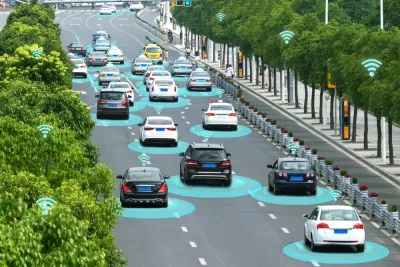A study about planning for AVs shows that most cities are not actively working to prepare for them and officials are worried about the many potential effects they will have on cities.

A new article in the Journal of the American Planning Association takes a closer look at how cities are preparing for autonomous vehicles. MIT researchers reviewed plans from the 25 largest U.S. cities and surveyed transportation and planning officials in 120 cities across the country.
The findings show that few cities have started preparing for AVs. "Only a tiny fraction of survey respondents said that their town had a 'clear plan' for autonomous vehicles, and just 36 percent of the largest cities have general plans that mention AVs. Even fewer, 24 percent, have issued separate strategies for maximizing the possible safety and congestion-easing benefits of self-driving cars," reports Laura Bliss.
Most cities report that they are waiting on federal or state legislation to come through and larger, more populated cities are more likely to be prepared. And while officials are looking to the benefits of AVs on roads, a third of respondents are also concerned about the potential negative impacts of the vehicles, including increases in vehicle miles traveled and sprawl and decreases in transit ridership and local revenues.
FULL STORY: Why Aren’t Cities Getting Ready for Autonomous Vehicles?

Maui's Vacation Rental Debate Turns Ugly
Verbal attacks, misinformation campaigns and fistfights plague a high-stakes debate to convert thousands of vacation rentals into long-term housing.

Planetizen Federal Action Tracker
A weekly monitor of how Trump’s orders and actions are impacting planners and planning in America.

In Urban Planning, AI Prompting Could be the New Design Thinking
Creativity has long been key to great urban design. What if we see AI as our new creative partner?

Florida Seniors Face Rising Homelessness Risk
High housing costs are pushing more seniors, many of them on a fixed income, into homelessness.

Massachusetts Budget Helps Close MBTA Budget Gap
The budget signed by Gov. Maura Healey includes $470 million in MBTA funding for the next fiscal year.

Milwaukee Launches Vision Zero Plan
Seven years after the city signed its Complete Streets Policy, the city is doubling down on its efforts to eliminate traffic deaths.
Urban Design for Planners 1: Software Tools
This six-course series explores essential urban design concepts using open source software and equips planners with the tools they need to participate fully in the urban design process.
Planning for Universal Design
Learn the tools for implementing Universal Design in planning regulations.
Gallatin County Department of Planning & Community Development
Heyer Gruel & Associates PA
JM Goldson LLC
City of Camden Redevelopment Agency
City of Astoria
Transportation Research & Education Center (TREC) at Portland State University
Jefferson Parish Government
Camden Redevelopment Agency
City of Claremont




























